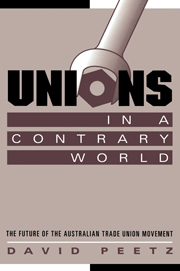Book contents
- Frontmatter
- Contents
- List of Figures
- List of Tables
- Acknowledgments
- Abbreviations
- 1 Patterns and Issues in Union Decline
- 2 Joining and Leaving Unions
- 3 Sympathy for Unions
- 4 Structural Change in the Labour Market
- 5 The Institutional Break in Union Membership
- 6 Within the Workplace
- 7 The Accord and the Post-Accord Industrial Relations Order
- 8 The Future for Australian Unions
- Appendix: Research Methodologies and Data Sources
- Notes
- Glossary
- Bibliography
- Index
3 - Sympathy for Unions
Published online by Cambridge University Press: 05 November 2011
- Frontmatter
- Contents
- List of Figures
- List of Tables
- Acknowledgments
- Abbreviations
- 1 Patterns and Issues in Union Decline
- 2 Joining and Leaving Unions
- 3 Sympathy for Unions
- 4 Structural Change in the Labour Market
- 5 The Institutional Break in Union Membership
- 6 Within the Workplace
- 7 The Accord and the Post-Accord Industrial Relations Order
- 8 The Future for Australian Unions
- Appendix: Research Methodologies and Data Sources
- Notes
- Glossary
- Bibliography
- Index
Summary
A number of studies have distinguished between ‘ideological’ and ‘instrumental’ reasons for belonging to a union. Researchers have used a range of names with varying degrees of elegance – such as ‘enterprise unionateness’ and ‘social unionateness’ or ‘instrumental unionism’ and ‘social unionism’ (e.g. Prandy et al. 1974, 1982) – to distinguish between these or similar concepts. In this book, the term ‘union sympathy’ is used to describe the general, ideological views about unions held by employees, and ‘union instrumentality’ to describe the extent to which employees consider they will benefit or have benefited from union membership.
Union sympathy and instrumentality may vary between situations and countries (Gallagher & Strauss 1991). Perceptions that unions improve the welfare of all workers have been found to provide a substantial independent, altruistic reason for union membership in the US (Fiorito 1992). Some researchers suggest that changes in ideological views of unions can affect union density. Lipset (1986) argues that the success (or failure) of US unions in organising and recruiting is correlated with measures of the public approval of unions. Measures of the general image of unions have revealed image to have a strong influence upon the likelihood of union membership or propensity in the US (Getman et al. 1976; Schriesheim 1978; Youngblood et al. 1984; Deshpande & Fiorito 1989) and Belgium (Gevers 1992). A few Australian studies have shown the importance of ideological views of unions in influencing membership of Australian unions (Christie & Miller 1989:263–8; De Cieri 1991; Christie 1992; Deery & Grimes 1994).
- Type
- Chapter
- Information
- Unions in a Contrary WorldThe Future of the Australian Trade Union Movement, pp. 56 - 64Publisher: Cambridge University PressPrint publication year: 1998

